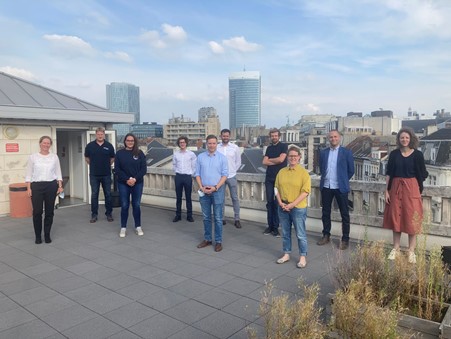September 2021 – The European RiskPACC project led by the German applied research institute Fraunhofer and in which Efus is a partner, which seeks to improve coordination between civil protection agencies and citizens to strengthen resilience to disasters, started on 1 September.
Funded by the H2020 European research programme, the project will hold its kick-off meeting on 13-14 September in a hybrid format online and in Brussels.
Increasingly complex risks
Of a duration of three years, the project is based on two observations: European Union countries are faced with increasingly complex and interconnected risks, which call for greater individual and collective resilience, and such resilience is strongly linked to the need to improve coordination between civil protection agencies and citizens. However, there is a gap between citizens and civil protection agencies in the way they perceive risks, which impacts their initiatives and actions.
Three objectives
In order to bridge this gap, the project has set three objectives:
- to better understand this gap between civil protection authorities and agencies on the one hand and citizens on the other;
- to develop technical and methodological solutions to improve the efficiency of communication between civil protection agencies and citizens and thus strengthen resilience;
- to include the new forms of data generation by citizens in the conventional approaches in order to design better practices and responses.
Practical solutions and tools
The project will start with a study of scientific literature and the identification of promising international practices in strengthening resilience. In the following stage, based on on-site case studies in the project’s partner cities, the RiskPACC partners will collaboratively work on solutions and tools based on new forms of digital and community-centred data. These solutions will then be tested and adapted to be transferable to any interested local authority. Furthermore, based on this research and work, the project will formulate recommendations and guidelines on how to implement these tools and solutions.
The role of Efus
Efus will be an important partner in this project, which gathers 19 other institutions and organisations*. Efus will notably lead the activities related to the validation of the model and the identification of solutions introduced elsewhere in Europe. It will also contribute to the project’s recommendations.
A logical continuation of the ALARM project
For Efus, the RiskPACC project is a logical continuation of the ALARM project, which sought to improve operational coordination between emergency services on both sides of the French-Belgian border. The work carried out through ALARM on the legal framework of transborder cooperation during crises, on key principles of communication with citizens, and to identify 200 international cooperation practices will enrich the RiskPACC project.
* Fraunhofer Institute (Fraunhofer Gesellschaft für Angewandte Forschung, Germany), Trilateral Research (UK) Institute of Communication and Computer Systems, National Technical University of Athens (Greece), University of Warwick (UK), Center for Security Studies (KEMEA, Greece), European Organisation for Security (Belgium), Czech Association of Fire Officers (Czech Republic), University of Stuttgart (Germany), Service Public Fédéral Intérieur (Belgium), University of Twente (Netherlands), Municipality of Eilat (Israel), Magen David Adom (the national emergency response service of Israel), University College London (UK), CrowdSense BV (Netherlands), STAM (Italy), International Search and Rescue (Germany), Lancashire Constabulary (UK), Municipality of Rafina-Pikermi (Greece), Municipality of Padova (Italy).





